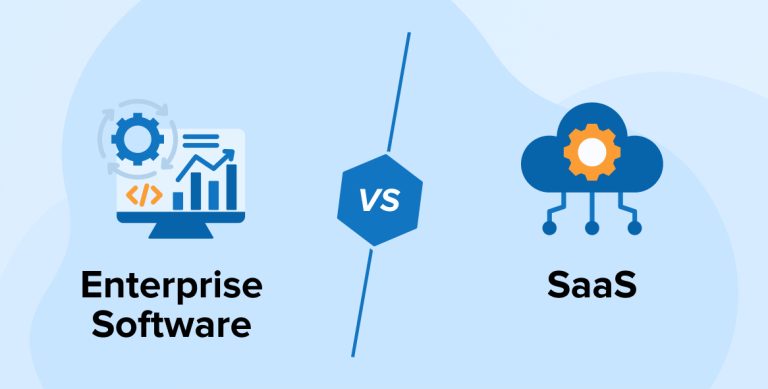Custom Software vs. SaaS: What’s the Right Choice for Your Business?
Companies rely on software to manage everything from customer interactions to internal workflows, making the choice of software solution a critical decision. The options generally fall into two categories: Custom Software and Software as a Service (SaaS).
The global SaaS market is forecasted to reach $702.19 billion by 2030, underscoring its popularity among businesses seeking affordable, scalable solutions that can be deployed quickly. With SaaS spending up by 40% since 2020, it’s clear that organizations are turning to cloud-based software for flexibility and speed. On the other hand, the global custom software development market was valued at $35.42 billion in 2023 and is projected to grow at an impressive CAGR of 22.5% from 2024 to 2030. This surge is largely driven by industries like healthcare and finance, where nearly 60% of companies opt for custom solutions to meet stringent compliance, security, and operational requirements.
SaaS solutions offer cost-effectiveness and rapid deployment, while custom software provides the flexibility to tailor applications precisely to business requirements. So, how do you decide? In this blog, we’ll explore both options in detail, discussing their benefits, limitations, and ideal use cases to help you make an informed choice.
Understanding SaaS: Convenient, Cost-Effective, and Scalable
Software as a Service (SaaS) is a subscription-based, cloud-hosted software solution. Instead of being custom-built, SaaS applications are pre-designed by third-party providers and accessible over the internet. Popular SaaS examples include Salesforce for CRM, QuickBooks for accounting, and Slack for team collaboration.
Advantages of SaaS Solutions
- Quick and Easy Implementation
- SaaS solutions are pre-built and maintained by vendors, allowing businesses to implement them quickly, often within hours or days. This speed-to-market makes SaaS an attractive option for companies needing an immediate, scalable software solution.
- Lower Upfront Costs and Predictable Pricing
- SaaS typically operates on a subscription model, which eliminates large upfront development costs. The subscription fee often includes maintenance, updates, and support, making it budget-friendly, especially for small and medium-sized enterprises (SMEs). Predictable monthly or annual fees allow businesses to plan expenses without surprises.
- Automatic Updates and Maintenance
- SaaS providers handle all updates, security patches, and maintenance, allowing businesses to focus on core activities without worrying about software upkeep. This also means you’re always using the latest version with the most recent features and improvements.
- Scalability and Accessibility
- Most SaaS solutions offer various subscription tiers, making it easy to upgrade as your business grows. SaaS applications are typically cloud-based, allowing team members to access the software from any device with an internet connection. This is particularly beneficial for companies with remote or distributed teams.
Limitations of SaaS Solutions
- Limited Customization
- SaaS solutions are designed to meet broad user needs, so customization options are often limited. Businesses with unique requirements may find themselves adapting their workflows to fit the SaaS software rather than the other way around.
- Data Privacy and Security Concerns
- Because SaaS solutions are hosted on third-party servers, sensitive business data is stored externally. While reputable providers implement strong security measures, companies in regulated industries may face additional compliance challenges with data stored offsite.
- Dependency on Vendor Reliability
- With SaaS, your business relies heavily on the vendor’s uptime and stability. Service interruptions, policy changes, or sudden price increases by the vendor can disrupt your operations. If the vendor goes out of business or discontinues the product, you may face challenges migrating to a new system.
Best Use Cases for SaaS
SaaS solutions are ideal for businesses that require immediate, affordable, and scalable software with minimal maintenance. This solution is especially suited to companies without an in-house IT team and those in need of standard functionalities like CRM, accounting, and project management tools.
Custom Software: Tailored Fit for Long-Term Success
Custom software is designed specifically for your business, addressing unique needs, workflows, and challenges. Unlike SaaS, which serves a broad audience, custom software is tailored to your specifications, offering a personalized user experience.
Advantages of Custom Software
- Complete Customization and Flexibility
- Custom software allows for full flexibility, as it’s designed specifically to meet your business’s needs. This means that every feature, function, and interface is tailored to your processes, increasing productivity and aligning perfectly with your business goals.
- Enhanced Security and Data Ownership
- With custom software, you have control over data storage and security protocols, which can be tailored to meet industry-specific compliance requirements. Custom solutions enable businesses to have full data ownership, reducing dependency on third-party vendors and providing peace of mind.
- Scalability to Support Growth
- Custom software can be designed with scalability in mind, allowing you to add new features, users, or integrations as your business grows. Unlike SaaS, where scalability is limited by subscription tiers or the vendor’s roadmap, custom software grows with your business, providing a long-term solution.
- Competitive Advantage
- Custom software can provide a competitive edge by offering unique features and functionalities that are specifically designed for your business model. Unlike generic SaaS applications, custom solutions can address niche needs, improve customer satisfaction, and streamline unique internal operations, setting you apart from competitors.
Limitations of Custom Software
- Higher Initial Investment
- Developing custom software requires a significant upfront investment in resources, from hiring developers to project management. While this can pay off in the long run, it may be prohibitive for startups or businesses with tight budgets.
- Longer Development Timeline
- Building software from scratch takes time, especially for complex applications. Depending on the project’s scope, it could take months to a year or more before a custom solution is fully functional. This can be challenging for businesses that need a quick turnaround.
- Ongoing Maintenance and Support
- With custom software, you are responsible for updates, maintenance, and troubleshooting. This requires a dedicated IT team or outsourced support, which adds to the overall cost. Unlike SaaS, where the vendor manages these tasks, custom software puts the onus on your business.
Best Use Cases for Custom Software
Custom software is best suited for businesses with specific needs that cannot be met by standard SaaS applications. Companies in regulated industries (e.g., finance, healthcare) benefit from custom solutions due to data security and compliance needs. Custom software is also valuable for businesses seeking a competitive edge through unique features and enhanced customer or operational experiences.
Custom Software vs. SaaS: Which Is Better for Your Business?
When deciding between SaaS and custom software, consider your company’s unique needs, budget, and growth strategy. Below is a comparative summary to help you make the right decision:
| Feature | SaaS | Custom Software |
| Implementation Time | Quick, typically hours to days | Longer, typically months |
| Cost | Low upfront, subscription-based | High upfront, ownership-based |
| Customization | Limited to available features | Fully customizable |
| Data Security | Managed by third-party | Full control over data security |
| Scalability | Subscription-based scaling | Scalable to specific business needs |
| Maintenance | Handled by vendor | Requires dedicated IT resources |
When to Choose SaaS
- If you need a fast and affordable solution: SaaS is ideal for businesses that want quick deployment without a large upfront investment.
- If you prefer vendor-managed updates: With SaaS, all maintenance and updates are handled by the vendor, which is advantageous if you lack in-house IT support.
- If you prioritize accessibility and collaboration: Most SaaS platforms are cloud-based, allowing remote teams to collaborate easily.
When to Choose Custom Software Solutions
- If you require tailored features: Custom software is a better fit if your business needs unique functionalities that are not available in generic SaaS applications.
- If data security and compliance are critical: Custom software provides full control over security measures and data storage, making it suitable for highly regulated industries.
- If scalability and long-term growth are priorities: Custom software can be developed with your future needs in mind, making it a scalable solution as your business expands.
Frequently Asked Questions (FAQs)
1. What is the main difference between SaaS and custom software?
- SaaS is a cloud-based, subscription-based solution developed by a third-party vendor to serve a broad audience, while custom software is built specifically for an individual business’s needs, providing full customization and control.
2. Is custom software more secure than SaaS?
- Custom software can offer higher security because businesses control data storage and access protocols. However, reputable SaaS vendors also invest heavily in security, though the data resides on third-party servers.
3. How long does it take to build custom software?
- Development timelines vary based on project complexity but typically range from several months to a year. SaaS, in contrast, can be deployed almost immediately.
4. Is SaaS or custom software better for small businesses?
- SaaS is generally more budget-friendly and manageable for small businesses due to its lower upfront costs, rapid deployment, and vendor-managed maintenance. Custom software may be more suitable for larger businesses with unique needs and resources.
Conclusion: Making the Right Decision for Your Business
Choosing between SaaS and custom software depends on various factors, including your budget, timeline, and specific business requirements. SaaS is an attractive option for businesses needing an affordable, accessible, and scalable solution with minimal maintenance. However, for businesses with unique needs, strict security requirements, or a desire for a competitive edge, custom software development might be a better investment in the long run.
Evaluate your company’s goals, industry demands, and operational needs to find the solution that aligns best with your vision. Both SaaS and custom software have their place in the modern business environment—what matters is choosing the right tool for the job.
Have questions about SaaS or custom software? Drop a comment below, and let’s discuss the best fit for your business needs!

